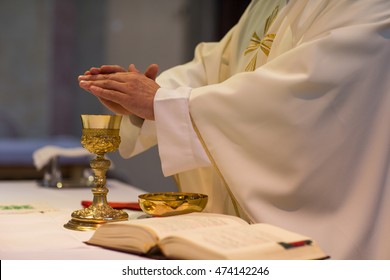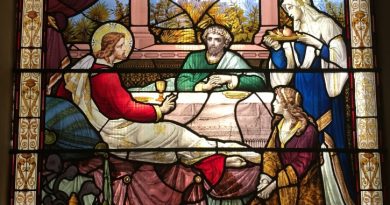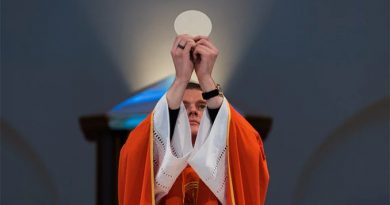Your Mass is very powerful! It is making miracles!
Some time ago an Orthodox believer told me this. Upon hearing such an affirmation I started wondering about the meaning of this powerful claim. When I asked why this person told me: “Yesterday I had temperature 38. I was feeling really weak. Today I am healthy. I went swimming”.
Her comment made me appreciate more the great benefits of the Mass. The Catechism of the Catholic Church beautifully lists these benefits of the Eucharist one by one.
The first benefit is that thanks to the Eucharist we become more united with Christ. Holy Communion augments our union with Christ. the principal fruit of receiving the Eucharist in Holy Communion is an intimate union with Christ Jesus. Indeed, the Lord said: “He who eats my flesh and drinks my blood abides in me, and I in him.” Life in Christ has its foundation in the Eucharistic banquet: “As the living Father sent me, and I live because of the Father, so he who eats me will live because of me.” On the feasts of the Lord, when the faithful receive the Body of the Son, they proclaim to one another the Good News that the first fruits of life have been given, as when the angel said to Mary Magdalene, “Christ is risen!” Now too are life and resurrection conferred on whoever receives Christ (no.1391).
The second benefit is that Eucharist helps us be separated from our sinfulness. Holy Communion separates us from sin. the body of Christ we receive in Holy Communion is “given up for us,” and the blood we drink “shed for the many for the forgiveness of sins.” For this reason the Eucharist cannot unite us to Christ without at the same time cleansing us from past sins and preserving us from future sins: “For as often as we eat this bread and drink the cup, we proclaim the death of the Lord. If we proclaim the Lord’s death, we proclaim the forgiveness of sins. If, as often as his blood is poured out, it is poured for the forgiveness of sins, I should always receive it, so that it may always forgive my sins. Because I always sin, I should always have a remedy” (St. Ambrose) (no.1393).
The third benefit is that our venial sins are literally wiped away. As bodily nourishment restores lost strength, so the Eucharist strengthens our charity, which tends to be weakened in daily life; and this living charity wipes away venial sins. By giving himself to us Christ revives our love and enables us to break our disordered attachments to creatures and root ourselves in him: “Since Christ died for us out of love, when we celebrate the memorial of his death at the moment of sacrifice we ask that love may be granted to us by the coming of the Holy Spirit. We humbly pray that in the strength of this love by which Christ willed to die for us, we, by receiving the gift of the Holy Spirit, may be able to consider the world as crucified for us, and to be ourselves as crucified to the world…. Having received the gift of love, let us die to sin and live for God” (St. Fulgentius of Ruspe) (no.1394).
The fourth benefit is that the Eucharist brings us into communion with other Christians and strenghtens and intensifies it more and more. The unity of the Mystical Body: the Eucharist makes the Church. Those who receive the Eucharist are united more closely to Christ. Through it Christ unites them to all the faithful in one body – the Church. Communion renews, strengthens, and deepens this incorporation into the Church, already achieved by Baptism. In Baptism we have been called to form but one body. The Eucharist fulfills this call: “The cup of blessing which we bless, is it not a participation in the blood of Christ? the bread which we break, is it not a participation in the body of Christ? Because there is one bread, we who are many are one body, for we all partake of the one bread:” (1 Cor 10:16-17). “If you are the body and members of Christ, then it is your sacrament that is placed on the table of the Lord; it is your sacrament that you receive. To that which you are you respond ‘Amen’ (“yes, it is true!”) and by responding to it you assent to it. For you hear the words, ‘the Body of Christ’ and respond ‘Amen.’ Be then a member of the Body of Christ that your Amen may be true” (St. Augustine) (no.1396).
Finally the Eucharist helps us celebrate it not simply on the liturgical altars but also on the existential altars of everday life. It opens our heart to share what we have with those who are suffering. The Eucharist commits us to the poor. To receive in truth the Body and Blood of Christ given up for us, we must recognize Christ in the poorest, his brethren: “You have tasted the Blood of the Lord, yet you do not recognize your brother,…. You dishonor this table when you do not judge worthy of sharing your food someone judged worthy to take part in this meal…. God freed you from all your sins and invited you here, but you have not become more merciful” (St. John Chrysostom) (no.1397).
In this sense, the Eucharist reminds us that the poor as the bankers for our long-term interest in heaven. In his homily for the World Day of the Poor 2020, celebrated on the 33rd Sunday of Ordinary Time, on 15 November 2020, Pope Francis said:
How then do we serve, as God would have us serve? The master tells the faithless servant: “You ought to have invested my money with the bankers, and at my coming I should have received what was my own with interest” (v. 27). Who are the “bankers” who can provide us with long-term interest? They are the poor. Do not forget: the poor are at the heart of the Gospel; we cannot understand the Gospel without the poor. The poor are like Jesus himself, who, though rich, emptied himself, made himself poor, even taking sin upon himself: the worst kind of poverty. The poor guarantee us an eternal income. Even now they help us become rich in love. For the worst kind of poverty needing to be combatted is our poverty of love. The worst kind of poverty needing to be combatted is our poverty of love. The Book of Proverbs praises the woman who is rich in love, whose value is greater than that of pearls. We are told to imitate that woman who “opens her hand to the poor” (Prov 31:20): that is the great richness of this woman. Hold out your hand to the poor, instead of demanding what you lack. In this way, you will multiply the talents you have received.
After all the Eucharist motivates us to show solidarity with those at the society’s fringes. As the encyclical letter on care for our common home, Laudato Si’, affirms: In the present condition of global society, where injustices abound and growing numbers of people are deprived of basic human rights and considered expendable, the principle of the common good immediately becomes, logically and inevitably, a summons to solidarity and a preferential option for the poorest of our brothers and sisters. This option entails recognizing the implications of the universal destination of the world’s goods, but, as I mentioned in the Apostolic Exhortation Evangelii Gaudium, it demands before all else an appreciation of the immense dignity of the poor in the light of our deepest convictions as believers (no.158).
When we place our brethren in need on our liturgical and existential altar the Lord can work great miracles indeed!
Fr Mario Attard OFM Cap





